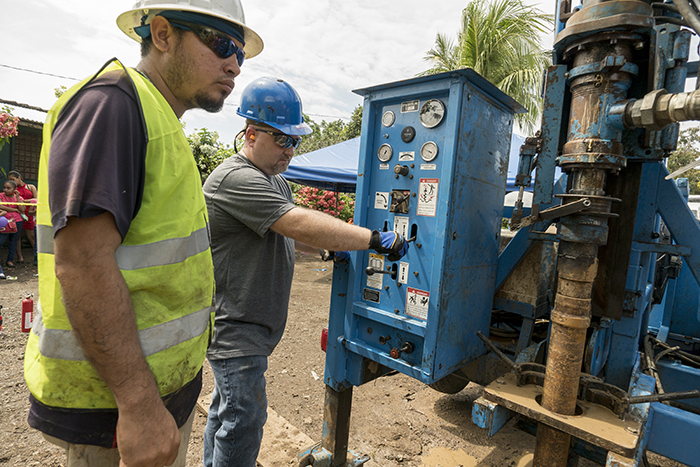A Central American excursion in search of living water and drinking water

“Cuidado! Se bajan!” These were the exclamations of the adults of Managuita de Talstuza, a community northeast of Tola in the foothills of the rugged Las Nubes mountains. They were speaking to a fearless 13-year-old boy who had scaled slippery and moss-covered rock to the top of a 50-foot waterfall that feeds a stream flowing through the community of 200 people.
The boy’s name is Jackson, and he is all boy—bright, curious brown eyes; energetic; and adventurous. He instantly captured the hearts of my wife and myself.
Jackson represents the story of countless Nicaraguans we met in Managuita de Talstuza, Juan Davila and Gaspar. You see, Jackson possesses two critical needs—one spiritual and one physical. Specifically, Jackson and his fellow Nicaraguans need the living water of Jesus Christ and clean drinking water.
Jackson lives in a meager home with a dirt floor and no air conditioning, surrounded by the community staples of free-roaming chickens, goats, pigs and turkeys. He traverses muddy paths and five stream crossings each day with other community children to attend a one-room school. Like most Nicaraguans, Jackson lives on less than $2.55 per day.
However, his living conditions are not what broke our hearts for Jackson. It was his story that drove us to prayer.
Jackson was abandoned by his mother when he was an infant, and his father has never been a part of his life. His parents’ viewed him as a burden and of no value. He currently lives with his grandmother and a family friend named Rosa, a sweet and generous lady who opened up her poverty-level (by U.S. standards) home to us with pride and joyfulness. Jackson is a hurting young man, evident by the tears that rolled down his cheeks after my wife and I prayed with him. He was overwhelmed and had a hard time comprehending why two Americans, one who spoke no Spanish and one with broken Spanish, would come all the way to Nicaragua to show him attention when his own mother and father placed so little value on his life that they abandoned him.
Jackson needs to know the saving grace of Jesus Christ, the love and compassion of the heavenly Father, and the encouragement and guidance of the Holy Spirit. The fact that two American strangers would hug him and pray for him was more than he could bear. He cried and I cried.
There is tremendous opportunity for evangelism, discipleship and church planting in Nicaragua, as only 30 percent of the 6.2 million Nicaraguans are evangelical.[1] The living water of Jesus needs to permeate the country. “The harvest is plentiful, but the laborers are few” (Luke 10:2).
In addition to his spiritual need, Jackson needs access to clean drinking water. The community of Managuita de Talstuza currently obtains water from the river that runs through the community or from an open, hand-dug well that concomitantly services people and cattle. Neither the water in the well nor the water from the river are clean. A quick perusal of the home site and what we literally stepped in provided direct evidence of how animal and human fecal contaminants enter their water system and why insect-borne diseases and water-borne parasites are so prevalent. In addition, toilet services are nonexistent.
Jackson’s community represents much of Nicaragua, with 32 percent of the rural population not possessing potable water and 63 percent without sanitation services.[2] My wife and I accompanied Living Water International (LWI, http://water.cc) on the trip to Nicaragua in order to catch a glimpse of their ministry and to prepare a story for the upcoming issue of Southwestern News.[3] LWI has been active in Nicaragua since 2004 and has drilled water wells for more than 400 communities. Worldwide, they have completed approximately 18,000 water projects in more than 20 countries.
The goal of LWI is to demonstrate the love of God by helping communities acquire desperately needed clean water and experience “living water”—the Gospel of Jesus Christ—which alone satisfies the deepest thirst. We were able to see the stark contrast between Jackson’s community in Managuita de Talstuza, where no clean water is present, and the community of Juan Davila, where a water well has been drilled and hand-washing stations have been installed at the school. Hand-washing with clean water significantly saves lives, cutting the incidence of diarrhea and acute respiratory infections markedly.[4] In the community of Gaspar, I was able to participate in drilling a water well. The community’s excitement was palatable as they awaited the drilling rig to bore 120 feet down to an aquifer of clean water.
Jackson will always have a place in our hearts, and we hope to visit him again soon. He is a living reminder that there are 6.2 million Nicaraguans and 7 billion people on the globe who need to be told the Gospel of the living water of Jesus. Moreover, he reminds us how being compassionate and providing a physical need affords the opportunity to be in relationship with people so that they will stop and hear the Gospel we actively proclaim. Being the hands and feet of Jesus gives us access to the ears and hearts of the lost.
[1]The Joshua Project, retrieved from https://joshuaproject.net/countries/NU; The United Nations Development Programme’s Human Development Reports, retrieved from http://hdr.undp.org/en/countries/profiles/NIC.
[2]The World Bank, retrieved from http://data.worldbank.org/data-catalog/world-development-indicators.
[3]Look for the story in the winter issue of Southwestern News (swnews.org).
[4]Living Water International and The Global Public-Private Partnership for Handwashing, retrieved from http://water.cc/whywater.



